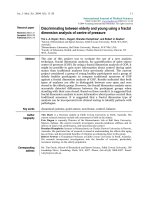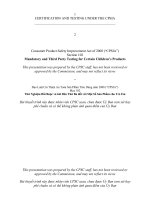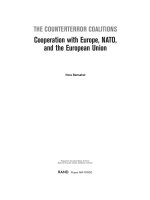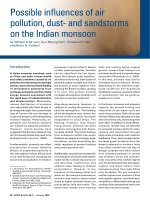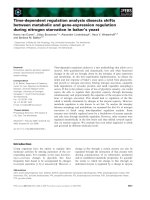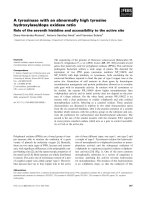Between Competition and Free Movement The Economic Constitutional Law of the European Community doc
Bạn đang xem bản rút gọn của tài liệu. Xem và tải ngay bản đầy đủ của tài liệu tại đây (599.43 KB, 204 trang )
BETWEEN COMPETITION AND FREE MOVEMENTBetween Competition and
Free Movement
The Economic Constitutional Law
of the European Community
JULIO BAQUERO CRUZ
OXFORD – PORTLAND OREGON
2002
Hart Publishing
Oxford and Portland, Oregon
Published in North America (US and Canada) by
Hart Publishing c/o
International Specialized Book Services
5804 NE Hassalo Street
Portland, Oregon
97213-3644
USA
Distributed in the Netherlands, Belgium and Luxembourg by
Intersentia, Churchillaan 108
B2900 Schoten
Antwerpen
Belgium
© Julio Baquero Cruz 2002
Julio Baquero Cruz has asserted his right under the Copyright, Designs and
Patents Act 1988, to be identified as the author of this work
Hart Publishing is a specialist legal publisher based in Oxford, England.
To order further copies of this book or to request a list of other
publications please write to:
Hart Publishing, Salter’s Boatyard, Folly Bridge,
Abingdon Road, Oxford OX1 4LB
Telephone: +44 (0)1865 245533 or Fax: +44 (0)1865 794882
e-mail:
WEBSITE: http//www.hartpub.co.uk
British Library Cataloguing in Publication Data
Data Available
ISBN 1–84113–336–3 (hardback)
Typeset by Hope Services (Abingdon) Ltd.
Printed and bound in Great Britain on acid-free paper by
Biddles Ltd, www.biddles.co.uk
Foreword
The book we present to the public was originally a PhD dissertation brilliantly
defended by the author before the Law Department of the European University
Institute, at Florence. We were the two supervisors of this thesis, a rather pas-
sive role in this case, considering the dynamism and talents of the candidate.
The book deals with a specific problem of economic Community law: the
interaction, gaps and loopholes between competition and free movement. These
apparently classical problems concerning the application of free movement
rules to private persons and of competition rules to public authorities are dealt
with from a constitutional perspective. The subject is indeed about filling gaps
in the economic constitutional law of the Community.
The author starts from what he calls an operational or workable (legal) con-
cept of the constitution, which he draws from the traditions of constitutional-
ism as it has evolved beyond the liberal concept of the XIXth century, in Europe
and in the United States. His definition of the constitution is as remarkable
because of what he excludes from it as it is because of the elements that are con-
ceived as essential. Considering the constitutional mandate received by the
Convention created by the European Council meeting in Laeken, the synthesis
proposed by Julio Baquero is particularly topical and opportune. It helps also to
realise that a constitution is not in itself a manna. Its value depends on its con-
tent. It seems to be stating the obvious but it is well known that, for some, this
exercise is more about limiting the ambitions of the Union than about allowing
its well-ordered development on the scale of the Continent. On the other hand,
the constituent power is not for the author an inherent element of the concept.
The enduring acquiescence to the constitution of most of the persons living in a
polity is more important than the historical democratic adoption made by their
ancestors. Such a view does not deny a legitimating virtue, for example, to a
European referendum.
For Julio Baquero, competition and free movement are of paramount import-
ance in the economic constitutional law of the Community, as it is confirmed by
the case law of the Court. That does not mean that other principles are not pro-
gressively finding their way, but they are perhaps different in nature, either as
fundamental rights (gender equality) or as guiding political principles (eco-
nomic and social cohesion), environmental rules being a blend of both. The
importance of the constitutionalisation role of the Court of Justice is another
caveat for the participants to the Laeken Convention. Any constitutional draft
should take on board the important achievements of the case law especially for
the private parties. If it is indeed admissible in a Constitution to find sections of
an unequal normative value, such as so-called declaratory provisions next to
positive rules, directly enforceable, it would be a legal regression to deny a con-
stitutional rank to the basic rules of the single market. A constitutional norm is,
indeed, as recalled by Julio Baquero, one that ‘cannot be reviewed against other
legal norms, which may be driven out of the legal order by the judiciary if in
breach thereof’. In this vein, the author proposes a legal distinction for the con-
cepts of positive and negative integration. ‘Negative integration’ is the set of
rules included in the economic constitutional law, like, for example, the prohi-
bition of discrimination on the ground of nationality, a principle that infuses the
whole Treaty; ‘positive integration’, the rules laid down by legislation under the
Constitution.
The later chapters of the thesis (not the second part of it, because each chap-
ter builds on the previous one, adding a piece of reasoning in the demonstration
like a large puzzle) are dedicated to the analysis of the case law of the Court,
illustrating the problematic of what has been termed the ‘privatisation’ of free
movement rules and ‘publicisation’ of competition, the subject of a famous con-
troversy between Pierre Pescatore and Giuliano Marenco.
On the subject of private conduct running counter to the purpose of the free
movement rules, the author concludes, after an examination of the pertinent
case law, that private action may be caught by the Treaty rules on free move-
ment only when it is not unlike State action, ie when it amounts to some sort of
private legislation which restricts free movement with protective intent or
effects. Other private action will be caught by the competition rules (under-
takings) or by the fundamental rights jurisprudence of the Court of Justice (free-
dom of trade), if it clearly violates such rights. This is meant to preserve one of
the principles inherent in the operational concept of constitution defended by
the author: the existence of a protected sphere of autonomy for the persons liv-
ing in the polity.
For the review of State action, the author would like to see the Court favour-
ing the free movement route over the competition route in preference to the
rather formalist tests applied by the Court in its jurisprudence. Protectionist
measures are more frequent than purely anticompetitive ones that cannot be jus-
tified. If the free movement rules are not breached, Julio Baquero proposes that
the analysis should afford a degree of deference to the legislator, whose legit-
imacy among the State’s organs is the greatest. This approach, which modulates
the appreciation of a national measure with regard to the Treaty, taking into
account the State’s organ concerned, is not in line with the way the Court tradi-
tionally approaches such kind of potential conflicts. There is no immunity for
the organ reflecting directly the opinions deriving from universal suffrage. But
one must admit that the proposed criterion has a constitutional logic, if seen in
the perspective of a nascent multi-level constitutionalism, and leaves the State
with room to manoeuvre in order to achieve objectives of economic policy tran-
scending the requirements of competition policy.
The preceding sketch can only give a partial view of the richness of ideas con-
tained in Julio Baquero’s book—in the fields of legal theory, comparative law
vi Foreword
(in particular, through his references to US law, but also to legal doctrine in var-
ious languages), public law, and, of course, Community law, both institutional
and economic. He has taken full advantage of his studies and research in
Madrid, Bruges, Florence and Columbia. He defends original views, inviting the
reader to continue the research, and to put to the test theories and opinions to
which the reader cannot remain indifferent. In doing so he does not hesitate to
swim against powerful currents in the present literature.
We wish the book the success it fully deserves.
Giuliano Amato and Jean-Victor Louis,
Firenze,
January 2002.
Foreword vii
This book is based on a PhD thesis written between September 1997 and
December 2000 at the European University Institute in Florence, under the joint
supervision of Giuliano Amato and Jean-Victor Louis.
The viva took place on 5 March 2001. The examining board was composed
of my supervisors, Gráinne de Búrca, Koen Lenaerts and Peter Oliver. I would
like to thank them for their comments, criticism and suggestions. I am especially
grateful to my supervisors, who were always of great help.
Also at the European University Institute, I would like to thank, among
others, Sophia Aboudrar, Miriam Aziz, Annick Bulckaen, Claus-Dieter
Ehlermann, Michelle Everson, Navraj Singh Ghaleigh, Christian Joerges, Makis
Komninos, Pedro Machado, Agustín Menéndez, Alan Milward, Bill Nardini,
Massimo la Torre, Alison Tuck, Alexandre Vaz-Pereira and Jacques Ziller.
I first became acquainted with some of the problems explored in this work
during the academic year 1995–1996 at the College of Europe (Bruges), through
the teachings of Joseph Weiler, Paul Demaret, Ami Barav and Alfonso Mattera.
I spent the spring semester of 2000 as an exchange scholar at Columbia
University in the city of New York, where I familiarised myself with some of the
problems of US constitutional law. At Columbia, George Bermann, Michael
Dorf, Louis Henkin, Peter Lindseth and Henry Monaghan gave me valuable
advice.
Anthony Arnull read and commented on a previous version of the chapter on
free movement and the private sphere, for which I am grateful. I thank Miguel
Poiares Maduro for commenting on drafts of some of the chapters. I am much
obliged to Michel Waelbroeck for his comments on a draft of chapter 8.
In December 2000, after handing in the thesis, I started working as
référendaire in the chambers of Gil Carlos Rodríguez Iglesias, President of the
Court of Justice of the European Communities. I would like to thank him for
the time he took to read the book, as well as his comments and criticism. At the
Court I have also benefited from the help of Fernando Castillo de la Torre. In
Luxembourg I have also had the chance to meet and discuss with Pierre
Pescatore, former judge of the Court, whose work has always been a source of
inspiration.
I would also like to mention the support of my parents and siblings from the
beginning.
The direct experience of the activity of the Court may have partly changed my
way of seeing things. Nonetheless, I have tried to preserve the spirit in which this
work was written, with necessary changes and updating. The opinions expressed
in this book are personal, and should not be attributed to the institution for
which I work. Despite the various debts accumulated in the preparation of this
work, it goes without saying that all opinions and remaining errors are mine
alone.
For the sake of clarity, only the indispensable references are included. In the
course of my research, to be sure, I have read and learnt from many others.
Sometimes I take one author as a representative of a whole doctrinal school. The
bibliography is, then, quite selective.
Primary sources are quoted in the conventional way. Citations in the text are
always in the English language. All translations are my own, unless otherwise
indicated. The original texts of the citations are provided in the footnotes.
Those judgments of the European Court of Justice that have not yet appeared in
the European Court Reports are quoted from the website of the Court
( The author is bound to acknowledge the unofficial char-
acter of the text of these judgments, which are provided free of charge. The law
is stated as at 28 February 2002.
J. B. C.
Luxembourg,
February 2002
x Preface
Contents
Table of Cases xv
Table of Legislation xxv
1. Themes, Intention and Method 1
2. Towards an Operational Concept of Constitution 7
2.1. Introduction 7
2.2. The Importance of Legal Concepts 8
2.3. An Operational Concept of Constitution 10
2.4. The Concept Explained 12
2.5. Federal Constitutionalism and the Supremacy of the
Constitution 17
2.6. Neil MacCormick’s Overlapping Legal Orders 19
3. The Constitution and the Economy 25
3.1. Introduction 25
3.2. Economic Constitutional Law versus the ‘Economic
Constitution’ 26
3.3. Economic Constitutional Law and its Transformations 29
3.4. The Role of the Judiciary 33
3.5. Oliver Wendell Holmes Jr. and the Economic Neutrality of
the Constitution 36
4. Community Constitutionalism Revisited 39
4.1. Doctrines and Realities 39
4.2. European Community (not Union) Constitutional Law 42
4.3. Community Constitutionalism 43
4.4. The Treaty as an Internal and External Community
Constitution 45
4.5. The Operational Concept Applied 48
A. Direct Effect and Supremacy 48
B. Extralegal Foundations, Internal Supremacy 50
C. Community Law and Individual Autonomy 51
D. The Democratic Element 52
E. Internal Hierarchy 56
4.6. The External View of Community Constitutionalism 57
5. Community Economic Constitutional Law 63
5.1. Form and Substance in Community Constitutional Law 63
5.2. The Centrality of the Concept of Internal Market 66
5.3. The Question of Hierarchy in Community Economic Law 69
5.4. Constitutional and Statutory Interpretation 72
5.5. A Comparison with State Economic Constitutional Law 74
5.6. Economic Neutrality of the Community? 76
5.7. The Uncertain Future 81
6. Competition and Free Movement 85
6.1. The Complementary Character of Competition and Free
Movement 86
6.2. A Common Approach to the Free Movement Rules 91
6.3. The Special Case of the Free Movement of Workers 96
6.4. Shifting Attitudes Towards the Competition Rules 98
6.5. Procedural Reasons for the Blurring Between the Scopes of
Competition and Free Movement 103
7. Free Movement and the Private Sphere 105
7.1. Statement of the Problem 105
7.2. Horizontal Direct Effect? 106
7.3. Leading Cases 108
A. Walrave (1974) 109
B. Dansk Supermarked (1981) 110
C. Bosman (1995) 111
D. Commission v France (1997) 112
E. Recent Cases 114
7.4. An Analysis of Certain Proposals 117
A. Detlef Shaefer and Fundamental Rights 117
B. Wulf-Henning Roth and Article 12 119
C. Milner-Moore, Steindorff and the Last Sentence of Article 30 120
D. Binding Individuals Through National Courts? 120
7.5. Refining the Concept of Collective Private Measures 121
8. State Action Doctrine and Community Competition Law 127
8.1. Statement of the Problem 127
8.2. Relevant Texts, Structure and other Available Routes 128
A. The Enforcement Mechanism 128
B. Article 86 EC 129
C. State Aids 131
D. Free Movement 132
E. Other Provisions 134
xii Contents
8.3. Leading Cases 136
A. GB-INNO-BM (1977) 136
B. The 1985 Judgments: Leclerc and Cullet 139
C. The Test Refined: Asjes, Vlaamse Reisbureaus, Van Eycke
(1986–1988) 143
D. The 1993 Cases: ‘November Revolution’? 145
E. Recent Judgments 147
8.4. A Constitutional Approach 155
A. Problems with the State Action Doctrine in its Current
Form 155
B. A Constitutional Approach 158
9. Final Thoughts 163
Works Cited 165
Index 173
Contents xiii
EUROPEAN COURT OF JUSTICE AND COURT OF FIRST INSTANCE
1. Alphabetical
Adoui, Case 115/81 [1982] ECR 1665 120
Aher-Waggon, Case C–389/96 [1998] ECR I–4473 95
Ahmed Saaed, Case 66/86 [1989] ECR 803 133
Albany International BV, Case C–67/96
[1999] ECR I–5751 71, 72, 104, 124, 130, 150, 153
Allué, Case 33/88 [1989] ECR 1591 119
Alpine Investments, Case C–384/93 [1995] ECR I–1141 93
Alsthom Atlantique, Case C–339/89 [1991] ECR 117 120
Analir, Case C–205/99 [2001] ECR I–1271 73
Angonese, Case C–281/98 [2000] ECR I–4139 110, 114, 115, 116, 124
Apple and Pear Development Council, Case 222/82
[1983] ECR 4083 121, 122
Aragonesa de Publicidad, Joined Cases C–1/90 and C–176/90
[1991] ECR I–4179 75, 92
Arduino, Case C–35/99 [2002] ECR 0000 153, 154, 158
Asjes, Joined Cases 209 to 213/84 [1986] ECR 1425 104, 133, 143–145
Audi, Case C–317/91 [1993] ECR I–6227 145
Barber, Case C–262/88 [1990] ECR I–1889 50
BASF, Case C–44/98 [1999] ECR I–6269 94
Baumbast, Case C–413/99 [2001] ECR 0000 97
Bayer, Case T–41/96 [2000] ECR II–3383 101
BECTU, Case C–173/99 [2001] ECR I–4881 52
Belgapom v ITM Belgium, Case C–63/94 [1995] ECR I–2467 134
BNIC, Case 123/83 [1985] ECR 391 139, 147, 148, 158, 161
Bosman, Cases C–415/93 [1995]
ECR I–4921 92, 93, 103, 111, 112, 116, 124, 153
Bostock, Case 2/92 [1994] ECR I–955 51
Bouhelier, Case 53/76 [1977] ECR 197 92
Brasserie du Pêcheur/Factortame III, Joined Cases C–46/93 & C–48/93
[1996] ECR I–1029 49
British Telecommunications, Case C–392/93 [1996] ECR I–1631 49
Buys, Case 5/79 [1979] ECR 3203 139
Campus Oil, Case 72/83 [1984] ECR 2727 76
Cassis de Dijon, Case 120/78 [1979] ECR 649 79, 92, 153
CILFIT, Case 283/81 [1982] ECR 3415 58
Cinéthèque, Joined Cases 60 and 61/84 [1985] ECR 2605 51
Clinique, Case C–315/92 [1994] ECR I–317 104
CNSD v Commission, Case T–513/93 [2000] ECR II–1807 148, 149, 157, 161
Commission v Belgium, Case C–2/90 [1992] ECR I–4431 95
Commission v Council, Case 45/86 [1987] ECR 1493 56
Commission v France, Case 167/73 [1974] ECR 359 92
Commission v France, Case C–265/95 [1997] ECR I–6959 112, 113, 114, 118
Commission v Ireland, Case 249/81 [1982] ECR 4005 121
Commission v Italy, Case 118/85 [1987] ECR 2599 128
Commission v Italy, Case C–35/96
[1998] ECR I–3851 128, 129, 133, 147, 148, 149, 153
Consten & Grundig, Joined Cases 56 & 58/64 [1966] ECR 299 89, 99, 137
Costa v ENEL, Case 6/64 [1964] ECR 585 41, 45, 49, 106
Corsica Ferries France, Case C–266/96 [1998] ECR I–3949 94, 147
Courage, Case C–453/99 [2001] ECR 0000 71
Cowan, Case 186/87 [1989] ECR 195 119
Cullet, `Case 231/83 [1985] ECR 305 139–143
DaimlerChrysler, Case C–324/99 [2001] ECR 0000 73
Dansk Supermarked, Case 58/80 [1981] ECR 181 110, 116, 120, 121
Dassonville, Case 8/74 [1974] ECR 837 89, 92, 137
Decker, Case 120/95 [1998] ECR I–1831 77, 95
Defrenne, Case 43/75 [1976] ECR 173 96, 108, 114, 115, 116
Delhaize, Case 47/90 [1992] ECR 3669 75
Deliège, Joined Cases C–51/96 and C–191/97 [2000] ECR I–2549 104, 114
Demirel, Case 12/86 [1987] ECR 3719 51
Denkavit Nederland, Case 15/83 [1984] ECR 2171 68
De Peijper, Case 104/75 [1976] ECR 635 112
Deutsche Grammophon, Case 78/70 [1971] ECR 487 104
Deutsche Post, Joined Cases C–270/97 and C–271/97 [2000] ECR I–929 96
DIP, Joined Cases C–140 to 142/94 [1995] ECR I–3257 148
Donà, Case 13/76 [1976] ECR 1333 109
Dubois, Case C–16/94 [1995] ECR I–2421 108
Échirolles, Case C–9/99 [2000] ECR I–8207 142
Eco Swiss China Time, Case C–126/97 [1999] ECR I–3055 70, 71
Faccini Dori, Case C–91/92 [1994] I–3325 107
Fédéchar, Case 8/55 [1956] ECR 245 45, 46
Ferlini, Case C–411/98 [2000] ECR I–8081 115, 116, 119
Foto Frost, Case 314/85 [1987] ECR 4199 56
Francovich, Cases C–6/90 & C–9/90 [1991] I–5357 49
GB–Inno–BM v ATAB, Case 13/77
[1977] ECR 2115 134,136–139, 140, 142, 143, 145, 148, 158
Gebhard, Case C–55/94 [1995] ECR I–4165 92
Germany v Council, Case C–376/98 [2000] ECR I–8419 60, 79, 80
xvi Table of Cases
Gourmet International, Case C–405/98 [2001] ECR I–1795 93
Graf, Case C–190/98 [2000] ECR I–493 92
Greenwich, Case 22/79 [1979] ECR 3275 104
Grzelczyk, Case C–184/99 [2001] ECR I–6193 97
Guimont, Case C–448/98 [2000] ECR I–10663 134
Hag I, Case 192/73 [1974] ECR 731 91
Hag II, Case C–10/89 [1990] ECR I–3711 91
Hauer, Case 44/79 [1979] 3727 51, 98
Haug–Adrion, Case 251/83 [1984] ECR 4277 108
Höfner, Case C–41/90 [1991] ECR I–1979 128
Huiles usagées, Case 240/83 [1985] ECR 531 118
Hünermund, Case C–292/92 [1993] ECR I–6787 117
Iannelli, Case 74/76 [1977] ECR 557 92, 131
Internationale Handelsgesellschaft, Case 11/70 [1970] ECR 533 49, 51
Italy v Council and Commission, Case 32/65 [1966] ECR 389 49, 99, 100
Italy v Commission, Case C–361/98 [2001] ECR I–385 73
John Deere, Case C–7/95 P [1998] ECR I–3111 103
Keck and Mithouard, Joined Cases C–267 & C–268/91
[1993] ECR I–6097 92, 93, 94, 117, 134, 145, 155
Khalil, Case C–95/99 [2001] ECR 0000 73
Kohll, Case C–158/96 [1998] ECR I–1931 95
Köster, Case 25/70 [1970] ECR 1161 55
Ladbroke Racing, Joined Cases C–359/95 P and C–379/95 P
[1997] ECR I–6265 161
Lancry, Joined Cases C–363/93 and C–407 to C–411/93
[1994] ECR I–3957 78, 133
Leclerc, Case 229/83 [1985] ECR 1 90, 139–143, 144, 145, 160
Lehtonen, Case C–176/96 [2000] ECR I–2681 114
Les Verts, Case 294/83 [1986] ECR 1339 45, 46
Ligur Carni, Joined Cases C–277/91, C–318/91 and C–319/91
[1993] ECR 6621 75
Marleasing, Case C–106/89 [1990] ECR I–4135 49
Marshall, Case 152/84 [1986] ECR 723 107
Martínez Sala, Case C–85/96 [1998] ECR I–2691 97
Matra, Case T–17/93 [1994] ECR II–595 103
Meng, Case C–2/91, [1993] ECR I–5751 144, 145, 146, 147
Merck, Case 189/80 [1981] ECR 2063 50
Metro v Commission, Case 26/76 [1977] ECR 1875 66
Metronome, Case C–200/96 [1998] ECR I–1953 124
Meyhui, Case C–51/93 [1994] ECR I–3879 68
Mutsch, Case 137/84 [1985] ECR 2681 104
Nold, Case 4/73 [1974] ECR 491 51
Nordsee, Case 102/81 [1982] ECR 1095 110
Nungesser, Case 258/78 [1982] ECR 2015 111
Table of Cases xvii
Ohra, Case C–245/91 [1993] ECR I–5851 145, 146, 147
Opinion 1/76 Laying–Up Fund [1977] ECR 741 46
Opinion 1/91 EEA [1991] ECR I–6079 45, 46, 47, 70, 118
Opinion 1/94 WTO [1994] ECR I–5281 47, 60
Opinion 2/94 ECHR [1996] ECR I–1759 47, 52
Pavlov, Joined Cases C–180/98 to C–184/98
[2000] ECR I–6451 72, 150, 155, 161
Peralta, Case 379/92 [1994] ECR I–3453 94
Pigs Marketing Board, Cases 83/78 [1978] ECR 2366 104
Pinna, Case 41/84 [1986] ECR 1 56, 61
Pistre, Joined Cases C–321 to 324/94 [1997] ECR I–2343 133
Polydor v Harlequin, Case 270/80 [1982] ECR 329 66, 67
PreussenElektra, Case C–379/98 [2001] ECR I–2099 95, 140
Reiff, Case C–185/91 [1993] ECR I–5801 145, 146, 147, 148, 149, 153, 157
Remia, Case 42/84 [1985] ECR 2545 103
Reyners, Case 2/74 [1974] ECR 631 92
Royal Pharmaceutical Society, Joined Cases 266 & 267/87 [1989] 1295 121
Säger, Case C–76/90 [1991] ECR I–4221 92
Sandoz, Case C–439/97 [1999] ECR I–7041 92
San Michele, Case 9/65 [1967] ECR 37 49, 106
Sanz de Lera, Joined Cases C–163, 165 & 250/94 [1995] ECR I–4821 92
Schul I, Case 15/81 [1982] 1409 56, 57, 66
Schülter, Case 9/73 [1973] ECR 1135 66
Simmenthal, Case 106/77 [1978] ECR 629 106
Spediporto, Case C–96/94 [1995] ECR I–2883 147, 148
Stauder, Case 29/69 [1969] ECR 419 51
Suiker Unie, Joined Cases 40–48, 50, 54–56, 111, 113 and 114/73
[1975] ECR 1663 65
Telemarsicabruzzo, Joined Cases C–320 to 322/90
[1993] ECR I–393 95, 103, 104
TK–Heimdienst, Case C–254/98 [2000] ECR I–151 94
United Kingdom v Council, Case 68/86 [1988] ECR 855 56
Van Ameyde, Case 90/76 [1977] ECR 1091 109
Van Binsbergen, Case 33/74 [1974] ECR 1299 92
Van de Haar, Joined Cases 177 & 178/82 [1984] ECR 1797 90, 139
Van Duyn, Case 41/74 [1974] ECR 1337 120
Van Eycke, Case 267/86 [1988] ECR 4769 143–145, 147, 157
Van Gend en Loos, Case 26/62 [1963] ECR 1 45, 48, 92, 98, 106
Vlaamse Reisbureaus, Case 311/85
[1987] ECR 3801 116, 133, 143–145, 146, 147
Volkswagen, Joined Cases T–123/96 and T–143/96 [1999] ECR II–3663 101
Walrave, Case 36/74 [1974] ECR 1405 109
Wijsenbeek, Case C–378/97 [1999] ECR I–6207 97
Wouters, Case C–309/99 [2002] ECR 0000 151, 152, 161
xviii Table of Cases
Numerical
Case 8/55 Fédéchar [1956] ECR 245 45, 46
Joined Cases 56 & 58/64 Consten & Grundig [1966] ECR 299 89, 99, 137
Case 26/62 van Gend en Loos [1963] ECR 1 45, 48, 92, 98, 106
Case 6/64 Costa v ENEL [1964] ECR 585 41, 45, 49, 106
Case 9/65 San Michele [1967] ECR 37 49, 106
Case 32/65 Italy v Council and Commission [1966] ECR 389 49, 99, 100
Case 29/69 Stauder [1969] ECR 419 51
Case 11/70 Internationale Handelsgesellschaft [1970] ECR 533 49, 51
Case 25/70 Köster [1970] ECR 1161 55
Case 78/70 Deutsche Grammophon [1971] ECR 487 104
Case 4/73 Nold [1974] ECR 491 51
Case 9/73 Schülter [1973] ECR 1135 66
Joined Cases 40–48, 50, 54–56, 111, 113 and 114/73 Suiker Unie
[1975] ECR 1663 65
Case 167/73 Commission v France [1974] ECR 359 92
Case 192/73 Hag I [1974] ECR 731 91
Case 2/74 Reyners [1974] ECR 631 92
Case 8/74 Dassonville [1974] ECR 837 89, 92, 137
Case 33/74 Van Binsbergen [1974] ECR 1299 92
Case 36/74 Walrave [1974] ECR 1405 109
Case 41/74 Van Duyn [1974] ECR 1337 120
Case 43/75 Defrenne [1976] ECR 173 96, 108, 114, 115, 116
Case 104/75 de Peijper [1976] ECR 635 112
Opinion 1/76 Laying–Up Fund [1977] ECR 741 46
Case 13/76 Donà [1976] ECR 1333 109
Case 26/76 Metro v Commission [1977] ECR 1875 66
Case 53/76 Bouhelier [1977] ECR197 92
Case 74/76 Iannelli [1977] ECR 557 92, 131
Case 90/76 van Ameyde [1977] ECR 1091 109
Case 13/77 GB–Inno–BM v ATAB
[1977] ECR 2115 134, 136–139, 140, 142, 143, 145, 148, 158
Case 106/77 Simmenthal [1978] ECR 629 106
Cases 83/78 Pigs Marketing Board [1978] ECR 2366 104
Case 120/78 Cassis de Dijon [1979] ECR 649 79, 92, 153
Case 258/78 Nungesser [1982] ECR 2015 111
Case 5/79 Buys [1979] ECR 3203 139
Case 22/79 Greenwich [1979] ECR 3275 104
Case 44/79 Hauer [1979] 3727 51, 98
Case 58/80 Dansk Supermarked [1981] ECR 181 110, 116, 120, 121
Case 189/80 Merck [1981] ECR 2063 50
Case 270/80 Polydor v Harlequin [1982] ECR 329 66, 67
Case 15/81 Schul I [1982] 1409 56, 57, 66
Table of Cases xix
Case 102/81 Nordsee [1982] ECR 1095 110
Case 115/81 Adoui [1982] ECR 1665 120
Case 249/81 Commission v Ireland [1982] ECR 4005 121
Case 283/81 CILFIT [1982] ECR 3415 58
Joined Cases 177 & 178/82 Van de Haar [1984] ECR 1797 90, 139
Case 222/82 Apple and Pear Development Council [1983] ECR 4083 121, 122
Case 15/83 Denkavit Nederland [1984] ECR 2171 68
Case 72/83 Campus Oil [1984] ECR 2727 76
Case 123/83 BNIC [1985] ECR 391 139, 147, 148, 158, 161
Case 229/83 Leclerc [1985] ECR 1 90, 139–143, 144, 145, 160
Case 231/83 Cullet [1985] ECR 305 139–143
Case 240/83 Huiles usagées [1985] ECR 531 118
Case 251/83 Haug–Adrion [1984] ECR 4277 108
Case 294/83 Les Verts [1986] ECR 1339 45, 46
Case 41/84 Pinna [1986] ECR 1 56, 61
Cases 42/84 Remia [1985] ECR 2545 103
Joined Cases 60 and 61/84 Cinéthèque [1985] ECR 2605 51
Case 137/84 Mutsch [1985] ECR 2681 104
Case 152/84 Marshall [1986] ECR 723 107
Joined Cases 209 to 213/84 Asjes [1986] ECR 1425 104, 133, 143–145
Case 118/85 Commission v Italy [1987] ECR 2599 128
Case 311/85 Vlaamse Reisbureaus
[1987] ECR 3801 116, 133, 143–145, 146, 147
Case 314/85 Foto Frost [1987] ECR 4199 56
Case 12/86 Demirel [1987] ECR 3719 51
Case 45/86 Commission v Council [1987] ECR 1493 56
Case 66/86 Ahmed Saaed [1989] ECR 803 133
Case 68/86 United Kingdom v Council [1988] ECR 855 56
Case 267/86 Van Eycke [1988] ECR 4769 143–145, 147, 157
Case 186/87 Cowan [1989] ECR 195 119
Joined Cases 266 & 267/87 Royal Pharmaceutical Society
[1989] ECR 1295 121
Case 33/88 Allué [1989] ECR 1591 119
Case C–262/88 Barber [1990] ECR I–1889 50
Case C–10/89 Hag II [1990] ECR I–3711 91
Case C–106/89 Marleasing [1990] ECR I–4135 49
Case C–339/89 Alsthom Atlantique [1991] ECR 117 120
Joined Cases C–1/90 and C–176/90 Aragonesa de Publicidad
[1991] ECR I–4179 75, 92
Case C–2/90 Commission v Belgium [1992] ECR I–4431 95
Joined Cases C–6/90 & C–9/90 Francovich [1991] I–5357 49
Case C–41/90 Höfner [1991] ECR I–1979 128
Case 47/90 Delhaize [1992] ECR 3669 75
Case C–76/90 Säger [1991] ECR I–4221 92
xx Table of Cases
Joined Cases C–320 to 322/90 Telemarsicabruzzo
[1993] ECR I–393 95, 103, 104
Opinion 1/91 EEA [1991] ECR I–6079 45, 46, 47, 70, 118
Case C–2/91 Meng [1993] ECR I–5751 144, 145, 146, 147
Case C–185/91 Reiff [1993] ECR I–5801 145, 146, 147, 148, 149, 153, 157
Case C–245/91 Ohra [1993] ECR I–5851 145, 146, 147
Joined Cases C–267 & C–268/91 Keck and Mithouard
[1993] ECR I–6097 92, 93, 94, 117, 134, 145, 155
Joined Cases C–277/91, C–318/91 and C–319/91 Ligur Carni
[1993] ECR 6621 75
Case C–317/91 Audi [1993] ECR I–6227 145
Case 2/92 Bostock [1994] ECR I–955 51
Case C–91/92 Faccini Dori [1994] I–3325 107
Case C–292/92 Hünermund [1993] ECR I–6787 117
Case C–315/92 Clinique [1994] ECR I–317 104
Case 379/92 Peralta [1994] ECR I–3453 94
Case T–17/93 Matra [1994] ECR II–595 103
Joined Cases C–46/93 & C–48/93 Brasserie du Pêcheur/Factortame III
[1996] ECR I–1029 49
Case C–51/93 Meyhui [1994] ECR I–3879 68
Joined Cases C–363/93 and C–407 to C–411/93 Lancry
[1994] ECR I–3957 78, 133
Case C–384/93 Alpine Investments [1995] ECR I–1141 93
Case C–392/93 British Telecommunications [1996] ECR I–1631 49
Cases C–415/93 Bosman
[1995] ECR I–4921 92, 93, 103, 111, 112, 116, 124, 153
Case T–513/93 CNSD v Commission [2000] ECR II–1807 148, 149, 157, 161
Opinion 1/94 WTO [1994] ECR I–5281 47, 60
Opinion 2/94 ECHR [1996] ECR I–1759 47, 52
Case C–16/94 Dubois [1995] ECR I–2421 108
Case C–55/94 Gebhard [1995] ECR I–4165 92
Case C–63/94 Belgapom v ITM Belgium [1995] ECR I–2467, 134
Case C–96/94 Spediporto [1995] ECR I–2883 147, 148
Joined Cases C–140 to 142/94 DIP [1995] ECR I–3257 148
Joined Cases C–163, 165 & 250/94 Sanz de Lera [1995] ECR I–4821 92
Joined Cases C–321 to 324/94 Pistre [1997] ECR I–2343 133
Case C–7/95 P John Deere [1998] ECR I–3111 103
Case 120/95 Decker [1998] ECR I–1831 77, 95
Case C–265/95 Commission v France [1997] ECR I–6959 112, 113, 114, 118
Joined Cases C–359/95 P and C–379/95 P Ladbroke Racing
[1997] ECR I–6265 161
Case C–35/96 Commission v Italy
[1998] ECR I–3851 128, 129, 133, 147, 148, 149, 153
Case T–41/96 Bayer [2000] ECR II–3383 101
Table of Cases xxi
Joined Cases C–51/96 and C–191/97 Deliège [2000] ECR I–2549 104, 114
Case C–67/96 Albany International BV
[1999] ECR I–5751 71, 72, 104, 124, 130, 150, 153
Case C–85/96 Martínez Sala [1998] ECR I–2691 97
Joined Cases T–123/96 and T–143/96 Volkswagen [1999] ECR II–3663 101
Case C–158/96 Kohll [1998] ECR I–1931 95
Case C–176/96 Lehtonen [2000] ECR I–2681 114
Case C–200/96 Metronome [1998] ECR I–1953 124
Case C–266/96 Corsica Ferries France [1998] ECR I–3949 94, 147
Case C–389/96 Aher–Waggon [1998] ECR I–4473 95
Case C–126/97 Eco Swiss China Time [1999] ECR I–3055 70, 71
Joined Cases C–270/97 and C–271/97 Deutsche Post [2000] ECR I–929 96
Case C–378/97 Wijsenbeek [1999] ECR I–6207 97
Case C–439/97 Sandoz [1999] ECR I–7041 92
Case C–44/98 BASF [1999] ECR I–6269 94
Joined Cases C–180/98 to C–184/98 Pavlov
[2000] ECR I–6451 72, 150, 155, 161
Case C–190/98 Graf [2000] ECR I–493 92
Case C–254/98 TK–Heimdienst [2000] ECR I–151 94
Case C–281/98 Angonese [2000] ECR I–4139 110, 114, 115, 116, 124
Case C–361/98 Italy v Commission [2001] ECR I–385 73
Case C–376/98 Germany v Council [2000] ECR I–8419 60, 79, 80
Case C–379/98 PreussenElektra [2001] ECR I–2099 95, 140
Case C–405/98 Gourmet International [2001] ECR I–1795 93
Case C–411/98 Ferlini [2000] ECR I–8081 115, 116, 119
Case C–448/98 Guimont [2000] ECR I–10663 134
Case C–9/99 Échirolles [2000] ECR I–8207 142
Case C–35/99 Arduino [2002] ECR 0000 153, 154, 158
Case C–95/99 Khalil [2001] ECR 0000 73
Case C–173/99, BECTU [2001] ECR I–4881 52
Case C–184/99 Grzelczyk [2001] ECR I–6193 97
Case C–205/99 Analir [2001] ECR I–1271 73
Case C–309/99 Wouters [2002] ECR 0000 151, 152, 161
Case C–324/99 DaimlerChrysler [2001] ECR 0000 73
Case C–413/99 Baumbast [2001] ECR 0000 97
Case C–453/99 Courage [2001] ECR 0000 71
OTHER JURISDICTIONS
Danish Supreme Court
Maastricht Decision of 6 April 1998 (< />europa/domen/> visited on 11 August 1998) 58
xxii Table of Cases
French Conseil Constitutionnel
Decision 81–132 (Loi de nationalisation, Recueil des décisions du Conseil
Constitutionnel, 1982, 18) 35
Décision 92–312 (Maastricht 2, Recueil des décisions du Conseil
Constitutionnel, 1992, 76) 58
Décision 97–394 (Amsterdam, Recueil des décisions du Conseil
Constitutionnel, 1997, 344) 58
German Constitutional Court
BVerfGE, 1, 14, 32 (1951) 5
BVerfGE 4, 7, (1954) 35
BVerfGE 73, 339 (1986) 61
BVerfGE 89, 155 (1993) 58, 61
BVerfGE, 2 BvL 1/97 of 7.6.2000 61
Italian Constitutional Court
Judgment 12/63 (Giurisprudenza Costituzionale, 1963, 60) 75
Ordinanza 536/95 (Giurisprudenza costituzionale, 1995, 4459) 58
Portuguese Constitutional Court
Judgment 108/88 (Acordãos do Tribunal Constitucional, 1988, vol. 11, 83) 35
Spanish Constitutional Court
Judgment 37/81 (Jurisprudencia Constitucional, 1981, vol. II, 293) 35
Judgment 1/82 (Jurisprudencia Constitucional, 1982, vol. III, 1) 35
Judgment 71/82 (Jurisprudencia Constitucional, 1982, vol. IV, 401) 74
Judgment 88/86 (Jurisprudencia Constitucional, 1986, vol. XV, 368) 75
Judgment 52/88 (Jurisprudencia Constitucional, 1988, vol. XX, 658) 74
Judgment 28/91 (Jurisprudencia Constitucional, 1991, vol. XXIX, 287) 58
Judgment 180/93 (Jurisprudencia Constitucional, 1993, vol. XXXVI, 371) 58
Judgment 147/96 (Jurisprudencia Constitucional, 1996, vol. XLVI, 90) 58
Supreme Court of the United States
Fisher v City of Berkeley, 475 US 260 (1986) 159
Hoover, 466 US 558 (1984) 151
Table of Cases xxiii
Liquor v Duffy, 479 US 335 (1987) 159
Lochner v People of State of New York, 514 US 549 (1995) 36, 37
Nebbia v People of State of New York, 291 US 502 (1934) 35
Otis v Parker, 187 US 606 (1903) 36
Parker v Brown, 317 US 341 (1943) 158, 159
United States v Carolene Products Co., 304 US 144 (1938) 35
United States v Darby, 312 US 100 (1941) 35, 36
United States v Lopez, 514 US 549 (1995) 36
West Coast Hotel v Parrish, 300 US 379 (1937) 31
xxiv Table of Cases
Ta b le Legislation
EC AND EU TREATIES
Article 2 EU 43, 69
Article 6 EU 53
Article 7 EU, 8, 82
Article 34 EU 43
Article 38 EU 82
Article 47 EU 82
Article 48 EU 56, 82
Article 49 EU 53
Article 84 EU 82
Article 1 EC 102, 113
Article 2 EC 63, 65, 67, 90
Article 3 EC 63, 65, 69, 71, 80, 90, 109, 129, 135,
136, 137, 138, 140, 144, 146, 147, 148, 154
Article 4 EC 65, 78, 102, 140
Article 5 EC 80, 148
Article 6 EC 101, 102
Article 7 EC 48, 102
Article 10 EC 104, 111, 112, 113, 114, 129, 130, 136,
137, 138, 140, 144, 146, 147, 148, 150, 153, 154
Article 11 EC 84
Article 12 EC 10, 109, 115, 116, 119, 130
Article 14 EC 63, 66, 67, 80, 94, 97, 140
Article 16 EC 63
Article 18 EC 97, 98
Article 23 EC 66
Article 25 EC 92
Article 28 EC 10, 66, 74, 75, 89, 90, 92, 93, 106, 110, 112,
113–114, 116, 117, 120, 134, 136, 140, 143, 147
Articles 28–30 EC 73, 91, 114, 133, 137, 138, 144
Article 29 EC 92, 116, 120, 137, 139, 140
Article 30 EC 66, 79, 92, 93, 112, 120, 143
Article 31 EC 134,
Article 39 EC 97, 98, 109, 111, 114, 115, 124
Article 49 EC 109
Article 56 EC 95, 123
Article 80 EC 19, 73
